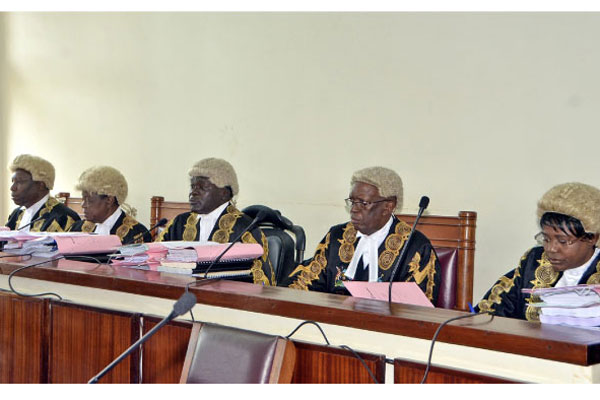One of the Justices of the Constitutional Court, Barishaki Bonny Cheborion has Thursday ruled that the extension of the tenure for Memebers of Parliament from the constitutional 5 years to 7 was done selfishly and it was unconstitutional.
Justice Barishaki was the first on the bench of 5 Justices to deliver his judgment in the consolidated petition seeking to annul the amendments passed by Parliament last year that among others repealed the Presidential age limit.
Court headed by the Deputy Chief Justice, Owiny Dollo is today delivering its ruling having began to hear the petition in March this year.
In the set of amendments, MPs voted to extend their tenure as well as that for Local Government elected councils from 5 to 7 years, beginning with the ongoing tenure. Similarly, they amended the tenure for the President to be prolonged for two years.
But petitioners challenged this saying that the decision to extend this term can only be made by the same Ugandans who elected these leaders in office on a 5-year contract. They further argued that the process lacked consultations with the electorate who have the supreme authority.
Justice Barishaki said that this extension was an attempt to circumvent Article 177 (4) of the constitution.
“This was an attempt to override the people’s power. There is no evidence by the respondent of consultations made in regard to these extensions. There ought to have been a referendum before the amendments were made,” Justice Barishaki said.
“Parliament did not have the authority without the provisions provided in the law. The amendment was selfish and goes against principles of good governance”.
He ruled that the selfish nature of the move by legislators is underlined by the fact that this extension was passed to take effect not with the subsequent Parliament but the current one.
He said that the people had been robbed of the opportunity to choose how they wanted to be governed.
The Justice stressed that the amendments ought to have taken into considerations all provisions of the constitution touching on the issue, but on the contrary, certain sections of the constitution including Arcile 8 (a)(1), Article 81 and Article 96 were violated.
Violence in Parliament and during consultations
In their petition, the challengers of the constitutional amendments argued that the process was marred with violence part of which was meted out by security agencies.
They particular made reference to the infamous raid on Parliament by security operatives in December last year an incident in which some MPs were assaulted, dragged out of Parliament and arrested.
On this issue, Justice Barishaki ruled that the intervention of security agencies including the UPDF into Parliament is provided for in the law as long as a situation was deemed to be an emergency that was beyond civilian authority.
“The intervention of the security was necessary to allow Parliament to continue with debate since some MPs exhibited unprecedented misconduct,” he said.
“The spectacle would not have taken place if the Members had heeded to a call of order by the Speaker,” the Justice said.
On whether the event in Parliament on that day suited the description of an emergency that required security operatives, the Justice made alluded to the throwing of chairs by MPs, injuring the Sargent at Arms’ personnel and the possession of a gun by one of the MPs which in his view constituted life threatening circumstances.
He added however that although the intervention was warranted, the manner in which the MPs were treated was degrading and inhuman, and contravened with Articles 24 and 21 of the constitution.
Justice e Barishaki as well condemned the actions by the Police Director of Operations, AIGP Asuman Mugenyi in issuance of directives prohibiting MPs from carrying out consultations on the Bill, outside their constituencies, terming them as “reckless” and “appalling”.
While AIGP Mugenyi defended the directives in his interface with court previously, saying they were based on intelligence that the MPs were planning to engage in violent acts, the Justice said there was no evidence provided to prove that.
He however disagreed with the notion by petitioners that the entire process of amendments was characterized by violence since in some cases, consultations were carried out smoothly.
Tenure of President
In regard to amending Article 105 of the constitution to extend of the term of the President to 7 years from 5, the Justice said that this can not be done without a referendum as required by Article 260.
Amendments that require a referundum are outlined in Article 260 and they include changing the tenure of office of the President. As such, he ruled in favor of the petitioners that this amendment was unconstitutional.
Age Limit
On the contetious issue of repealing the age limit for one’s eligibility to run for President, the Justice said he failed to find any evidence or law provision, which proved that by removing the Presidential Age Limit, Parliament in effected subverted the powers of the people, granted to them under Article 1 of the constitution.
“I am unable to agree with the petitioners’ proposition. If their argument was to hold, it would mean that Parliament has absolutely no powers to amend any provision of the constitution, since the entire constitution was passed by the people’s representatives in the constituent assembly,” he said.
Other issues on which Justice Barishaki ruled included whether or not the Private Member’s Bill was unlawful given its financial implication on the consolidated fund. On this, he said Article 93 provides for “reasonable assistance” by government or Parliament to such a Bill.
“But additional amendments that required a referendum violated the same Article 93 since a referendum would have a financial implication on the consolidated fund,” he said.
On the suspension of some MPs for three sittings by the Speaker, Rebecca Kadaga, the Justice defended the Speaker whom he said acted within the law due to the conduct by the MPs.










